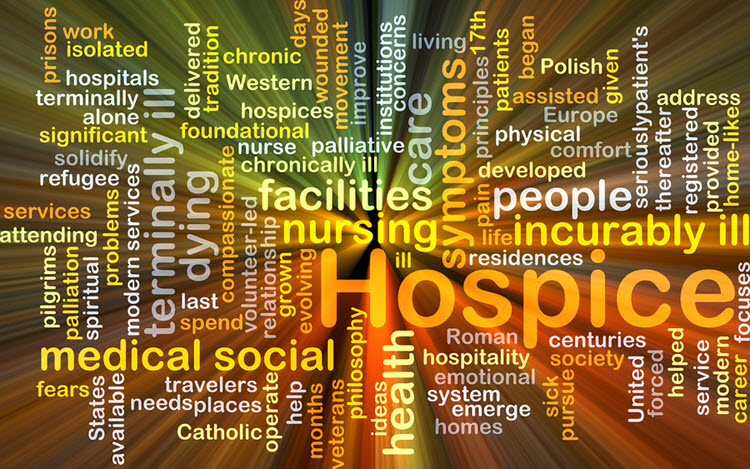How Can Agencies Differ?
Hospice programs are performed by licensed hospice agencies. Hospice agencies follow Medicare criteria for patient eligibility; however, each agency has some flexibility in facilitating their services. For example, a hospice agency may provide aide service on weekends. Hospices generally have some relationship with local hospitals and elder care communities (e.g. nursing homes and assisted living facilities). Additionally, all hospice agencies offer services in the home. (Jump to Questions to Ask)
No matter where hospice care occurs, it works within the guidelines set by Medicare and the National Hospice and Palliative Care Organization (NHPCO). One highlight of hospice is there is no co-pay or out of pocket expenses for hospice care. (“Hospice Who Pays for It?). Agencies differ in the way they implement the NHPCO guidelines. Look for an agency that understands and implements the concept of “Patient Centered Care” (PCC). The Institute of Medicine (IOM) defines PCC as: “providing care that is respectful of and responsive to individual patient preferences, needs, and values and ensuring that patient values guide all clinical decisions.”
Across hospice agencies, you will find the following team members:
- Attending Physician
- RN or APN (Nurse Case manager)
- Certified Home Health Aide
- Social Worker and Chaplain
Attending Physician:
Interaction is based on need or at the request from the family. However, they are always “on call” to answer questions, changes to the care plan and visits.
Nurse Case Manager:
Guidelines mandate that a nurse see the patient every 10 days, which works out to be a minimum of 3 times a month. If there is an unexpected problem that arises, the nurse may see your loved one three times a week. In such cases, agencies do have flexibility for more visits, but at additional cost to the agency.
In most hospice cases, the nurse will see the patient more at the end of life than at the early part of hospice. However, your nurse is always available by phone for questions or concerns. At first, I was surprised by how little time a nurse is mandated to be involved in hands-on patient care. But there is a tremendous amount of administrative work that goes into a care plan and reporting for the agency and government. Keep in mind the larger the case load a nurse carries, the less time there is for hands-on patient care. (Questions to Ask)
Certified Home Health Aide:
Most hospice agencies provide aide care up to 2 hours per day (Monday – Friday). Theoretically, an agency could give you more than the 2-hours a day but at an additional cost to the agency.
Determination of aide hours is dependent on patient needs. Most importantly, the family can tailor aide services to one hour a day, three days a week, or they can refuse aide service altogether. The hospice agency strives to schedule aide hours around the family’s schedule.
As a hospice team, the aide is constantly updating the nurse, and in turn, the nurse updates the doctor. Many times, it is the aide who will notice a tiny pin prick during a bath and notify the nurse to ward off bedsores. Although not onsite, the doctor is always involved in the process and decision maker for care.
Agency example: Embracing Hospicecare patients receive two hours a day of care from an aide, Monday through Friday, either at home or at a facility. However, when a facility has 4 or more hospice patients, Embracing Hospicecare assigns an aide to the facility for the entire day. That may not seem important, but when an aide does not have to watch the clock to commute to their next patient, it allows them to make a judgement call and go back to see a patient that may need more attention.
Social Worker and Chaplain:
Generally, chaplains and social workers are full time employees of the hospice agency. These team members are in-and-out of the care process and there is no mandated time per week, as there is for an aide and RN. How much time they spend with a hospice patient and how frequent those visits become, is specific to patient needs, or request from the family.
Hospice Levels of Care: General Inpatient, Basic, Continuous Home Care and Respite care.
General Inpatient (GIP):
GIP generally occurs within a medical environment, such as, a hospital. General Inpatient care is used when the “Basic Care” level is not enough for the hospice patient—meaning, the patient’s pain level exceeds the initial nurse visit. The decision to move to intense nursing care (GIP) involves the attending physician, nurse, and hospice agency. Most GIP patients are actively dying, so this level of care generally ends within 3-5 days. The hospice chaplain and nurse are most active for both the patient and the family during GIP care. Aide service is no longer needed.
Basic Care: Over 90% of hospice care falls under this care level.
Following the guidelines set out by NHPCO as required by Medicare, your hospice team will make intermittent visits to the home, are available by phone 24X7 and the team works as previously outlined in the post: (The Two Biggest Misconceptions About Hospice).
Continuous Home Care: (times of crisis only)
This is what most people think of when they think of Hospice – 24X7 care at home. Crisis care is not available at a facility. And it occurs only in a crisis. For example, a family can call hospice anytime if the patient is in great pain. Using a triage of nurses and/or LPN’s, the hospice team will come to the house and work 3 days on 8 hour shifts to manage pain symptoms at the home. When the pain is controlled, continuous care ends.
Respite Care:
Respite is a level of care provided by the hospice agency, when a family needs time off from caring. Respite situations vary, a family may need to go out of town for a weekend, or the caregiver may need respite from the responsibility for a longer period. There are no time frame guidelines for initiating respite care, but Medicare generally covers respite care for up to 5 days. In rare cases, the hospice agency may pay for additional days if the family needs more time. The hospice social worker helps guide the choice of facility for the family and arranges to-and-from transport. Respite care is not limited to a one-time opportunity. It is available when and as often, as the caregiver or family needs it.
- What is your nurse’s census? (e.g., case load or the number of patients for which they have responsibility). A good average is 12 patients per nurse. However, this number can increase depending if this nurse is in a rural or urban setting. Typically, hospice nurses carry between 15-17 patients. Hospice agencies are careful not to carry a high census. When a census is too high quality of care is compromised, communications for all involved is poor, and face-to-face time is shallow at best. Talk to several agencies, find out their census and compare. A census that is too low may indicate an agency that is struggling. A census that is two high may indicate poor care or a lack of communication.
- How many hours a week will the aide see mom/dad? Will she have the same aide as much as possible? How flexible is the schedule? Is the aide onsite at this facility the entire day?
This hospice series is dedicated to Mary Ellen Afflitto. Wife, mother, sister, aunt and friend with the most incredible upbeat attitude and wicked sense of humor. She is missed greatly and I am so grateful she was my aunt.
With thanks to my collaborator on the Hospice series, Victor Hudson
 Victor Hudson, Jr., is an ordained minister and church planter. He served in the United States Marine Corps and worked for Pfizer Inc. He currently works at Embracing Hospicecare out of Wall, NJ. He holds three masters degree, one in gerontology from the University of Southern California, an MBA from Regent University’s School of Business and Leadership, and a masters degree in religion from Liberty Baptist Theological Seminary. He is the father of two wonderful adult children, Kieya and Corey, and a proud grandfather of three boys, Javon, Jordan and Jacob. He lives in New Jersey with his wife, Yvonne.
Victor Hudson, Jr., is an ordained minister and church planter. He served in the United States Marine Corps and worked for Pfizer Inc. He currently works at Embracing Hospicecare out of Wall, NJ. He holds three masters degree, one in gerontology from the University of Southern California, an MBA from Regent University’s School of Business and Leadership, and a masters degree in religion from Liberty Baptist Theological Seminary. He is the father of two wonderful adult children, Kieya and Corey, and a proud grandfather of three boys, Javon, Jordan and Jacob. He lives in New Jersey with his wife, Yvonne.Disclaimer: The material in this blog is for educational purposes only. It is not intended to replace, nor does it replace, consulting with a physician, lawyer, accountant, financial planner or other qualified professional.

